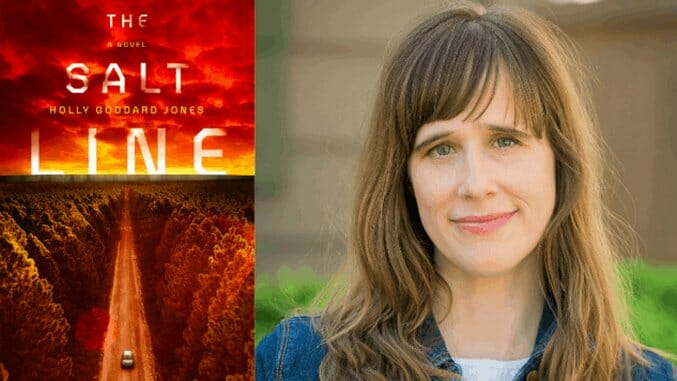The Salt Line: Holly Goddard Jones Talks Surviving a Post-Apocalyptic America
Author photo by Rachel McConoughey Books Features Holly Goddard Jones
“As a writer, I really like getting into the heads of different kinds of characters,” Holly Goddard Jones tells Paste in an interview about her post-apocalyptic novel The Salt Line. “I tell my [creative writing] students [at UNC-Greensboro] that it’s almost like a self-hypnosis, where I dive into something specific from a character’s past and attach myself to that, and riff on it until it unlocks things I didn’t know about them before.”
Jones started writing The Salt Line, her third book, back in 2012. What began as a short horror story in a Stephen King-like vein expanded into a dark odyssey through near-future American society that’s both ideologically and physically divided. The country is barely coping with threat of a terrifying new disease, a worsening drug crisis, elevated tensions over inequality, tech gurus trying to be would-be-saviors, and an unlikely political candidate advocating for walls to protect the already authoritarian-run city communities from an embellished threat of outer-zone dwellers.
Some of that sounds pretty familiar today, right? “But when I started,” Jones says, “the possibility of a Donald Trump presidency was one of the furthest things I could ever imagine. Clearly none of these recent issues are new with Trump, but I think it’s all just reached a fever pitch as he’s come to power. Initially there was a wall in the book, but it was almost darkly comical—like, the idea of ‘waste-repurposing-ramparts,’ constructed entirely of trash, turned into a barrier to keep out people we don’t want. I started thinking more about the wall, though, as a kind of political idea rather than a physical barrier.”
The primary barrier in this book is a “salt line” of scorched earth that protects city-zone citizens from the frightful miner tick, a new species that brings swift death to its bite victims. For the right price, thrill-seekers can take Outer Limits Excursions through the countryside and into Quarantine sanctuaries, where they can experience bygone charms like autumn foliage, star-strewn skies, and comparatively fresher air.
Early on in the book, Jones drops the reader into one of these treacherous journeys. City dwellers Edie and Marta are both yearning for a deeper sense of purpose in their lives; they are accompanied by the wealthy entrepreneur Wes, who is plagued with a similar sense of ennui. The trio winds up caught in the center of a murderous plot that pits Marta’s ruthless Mafioso husband back in the city against a fledgling non-city civilization presided over by a matronly chieftain named June.
Edie, Marta, and June each wrestle with their own questions about motherhood in the midst of the story’s simmering chaos, which reflects Jones’ real-world concerns while writing this novel. She had her first child in 2013 and her second in 2016.
“[Motherhood] just feels so fundamental to any commentary you want to make…about the Earth, about fear for the future, and about choosing between your small family unit and the world,” she says. “I don’t want to say, ‘Oh, I didn’t know what anything meant until I had kids,’ because that’s not what I’m implying. But motherhood definitely helped deepen my approach to this book and to these characters.”
The Salt Line’s most poignant moments occur when the perceived impenetrability of certain protective barriers is undermined. Both Marta and June deal with the protective instinct of a mother wanting to shield her offspring against the uncertainties of a broken world. Jones’ masterful use of suspense not only bends the style boundaries of dystopian lit, but it shows that the barriers we all often rely on can break.
“A wall is just an intoxicating idea that taps into the fears that people have about displacement, or about somebody taking something that belongs to them,” Jones says. “And nothing is ever going to allay those fears.”
Jeff Milo is a Detroit-based freelance writer who has covered books and music for Paste for several years. He reports on Michigan’s music scene for regional publications, as well as more unique features on his own website.